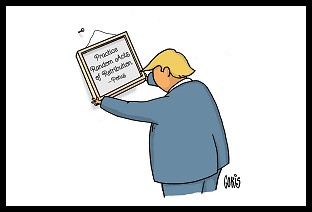 On today's BradCast, a close look at the scheme that Kentucky's Republican Governor may now be trying to pull off in hopes of stealing last Tuesday's election from the apparent Democratic winner. [Audio link to show follows below.]
On today's BradCast, a close look at the scheme that Kentucky's Republican Governor may now be trying to pull off in hopes of stealing last Tuesday's election from the apparent Democratic winner. [Audio link to show follows below.]
But, first up today, paper tiger Donald Trump, after vowing he'd never settle the case by New York Attorney General against his fraudulent "charitable" organization called the Trump Foundation, agreed to settle today after all. A state judge fined the President of the United States $2 million after finding he misused the foundation, repeatedly and illegally, to further his own political and business interests. Trump admitted to the wrong doing detailed in the settlement.
Moreover, the remaining $1.7 million in the organization's bank account will be donated, along with the $2 million fine, to several different charities, including the United Negro College Fund and U.S. Holocaust Memorial Museum. Trump and his three children who sat on the Foundation's board will be restricted in their ability to sit on the boards of charitable organizations in the future. And while one might think that being forced by a court to pay up nearly $4 million after admitting to using a charitable foundation to rip people off would be grounds for impeachment, given the indescribably unending criminality of Donald Trump, it seems unlikely this matter will even come up in the U.S. House's ongoing impeachment proceedings against him.
To that end, House Dems have announced the schedule for the first public hearings in the impeachment inquiry to kick off next Wednesday, featuring two of Trump's top State Department officials who will testify to his politically motivated extortion plot against Ukraine. One of those officials, Deputy Asst. Sec. of State George Kent, is said to have taken copious contemporaneous notes after becoming concerned that the White House's attempted quid pro quo was "injurious to the rule of law, both in Ukraine and the U.S," according to a transcript of Kent's recent closed-door Congressional deposition made public on Thursday.
But, of course, we are still covering the ongoing fall-out from Tuesday's off-year elections, in which Dems flipped the Virginia House and Senate "blue" for the first time in decades, and as brand-new touchscreen voting machines deployed in Pennsylvania and in Georgia failed disastrously on their initial trial run before 2020.
Today, we focus on the potentially disturbing developments in Kentucky, where the state's unpopular and very Trumpy Republican Gov. Matt Bevin is said to have lost by just over 5,000 votes (out of some 1.4 million cast) to Democratic challenger Andy Beshear on Tuesday. Since then, Bevin has refused to concede, citing "well-corroborated irregularities" including what he described on Wednesday as "'thousands of absentee ballots that were illegally counted," reports of voters being "incorrectly turned away" from the polls, and "a number of machines that didn't work properly." He has yet to offer actual details on those serious allegations, but has formally requested a "recanvass" of tallies. That, according to KY's Sec. of State, will be carried out next Thursday, in a state with a very recent history of serious election rigging --- at least by very powerful insiders.
However, while the Bluegrass State has rules to resolve contested elections with recounts, those statutes specifically do not apply to gubernatorial races, oddly enough. And that's where things get quite murky in the state. Contested gubernatorial races are settled by a vote of both Houses of the General Assembly. Both chambers in the state (which Trump won by some 30 points in 2016) are currently controlled by Republicans. The last time a gubernatorial contest occurred in the state --- in 1899 --- it ended with an assassination.
While a GOP scheme to steal the election from a Democrat this way seems ridiculously far-fetched at first glance, a number of normally quite conservative election law experts are taking the matter quite seriously, given Bevin's current playbook which, some of them suggest, mirrors that of his close pal Donald Trump and what he may do in 2020 if things don't go his way.
We're joined by one of the nation's top experts on all of this today, University of Kentucky College of Law's JOSHUA A. DOUGLAS, to explain what happened on Tuesday; why Bevin's scheme and potential help from GOPers in the state legislature could augur very darkly for our democratic system; what all of this means for Mitch McConnell (the other similarly unpopular statewide Republican who just happens to be on the 2020 ballot); and what --- if Bevin turns out to be the same paper tiger that Trump is --- we should expect from the new Democratic Gov. Beshear's administration in an otherwise still very "red" southern state.
"There is danger," Douglas tells me today. "but it's not about irregularities. It's about the Governor's rhetoric and his allegations of 'voter fraud' and problems without any evidence whatsoever. I think that's really dangerous for our democracy, because it can undermine the public's confidence in our electoral system. I have not seen any evidence whatsoever that there were any problems in the way that Tuesday's elections were run. In fact, it was a fairly quiet Election Day [and] I usually hear about things that might be concerning. The danger here is really Gov. Bevin's allegations without any evidence, and Republican leaders' failure to call him out on that point."
"It's very concerning for what could happen in 2020 if Trump does not win re-election, and he also refuses to concede defeat by peddling theories of 'voter fraud' without any evidence," says Douglas.
Tune in for much more!
Finally today, Desi Doyen joins us for the 999th edition of our Green News Report! And it's at least as disturbing as the previous 998. Next week: GNR1000! And thanks to those of you who make our nearly 11 years of climate coverage possible with your much-needed donations at BradBlog.com/Donate!
(Snail mail support to "Brad Friedman, 7095 Hollywood Blvd., #594 Los Angeles, CA 90028" always welcome too!)
|


 While We Were Out:
While We Were Out: 'Green News Report' 9/2/25
'Green News Report' 9/2/25
 Sunday 'Shots and Prayers' Toons
Sunday 'Shots and Prayers' Toons Cynical Hypocrisy Behind Right-Wing Opposition To CA's 'Election Rigging Response Act'
Cynical Hypocrisy Behind Right-Wing Opposition To CA's 'Election Rigging Response Act' Sunday 'Random Acts of' Toons
Sunday 'Random Acts of' Toons From CA's 'Nuclear Deterrence' Map to Newsom's Trolling to Trump's 'Fascist Theatre' and Beyond: 'BradCast' 8/21/25
From CA's 'Nuclear Deterrence' Map to Newsom's Trolling to Trump's 'Fascist Theatre' and Beyond: 'BradCast' 8/21/25 'Green News Report' 8/21/25
'Green News Report' 8/21/25 'Americanism' and Trump's 'Stalinesque' Plot to Whitewash History: 'BradCast' 8/20/25
'Americanism' and Trump's 'Stalinesque' Plot to Whitewash History: 'BradCast' 8/20/25 Texas GOP Imprisons Dem State Lawmaker in State House Chamber: 'BradCast' 8/19/25
Texas GOP Imprisons Dem State Lawmaker in State House Chamber: 'BradCast' 8/19/25 'Green News Report' 8/19/25
'Green News Report' 8/19/25 Trump, Nazis and Trump's Nazified Elections: 'BradCast' 8/18/25
Trump, Nazis and Trump's Nazified Elections: 'BradCast' 8/18/25 Sunday '
Sunday ' Newsom's 'Election Rigging Response Act'; FCC's License Renewal for Sock-Puppeting Sinclair: 'BradCast' 8/14/25
Newsom's 'Election Rigging Response Act'; FCC's License Renewal for Sock-Puppeting Sinclair: 'BradCast' 8/14/25 'Green News Report' 8/14/25
'Green News Report' 8/14/25 140 New House Reps?: Moving Beyond the Gerrymandering Wars: 'BradCast' 8/13/25
140 New House Reps?: Moving Beyond the Gerrymandering Wars: 'BradCast' 8/13/25 FCC Renews Sinclair Licenses Despite Complaint from Petitioner Who Died
FCC Renews Sinclair Licenses Despite Complaint from Petitioner Who Died It's Not About the Rule of Law, It's About Authoritarian Control: 'BradCast' 8/12/25
It's Not About the Rule of Law, It's About Authoritarian Control: 'BradCast' 8/12/25 After Vaccine Cancels, CDC Shooting, Former Officials Want RFK Out: 'BradCast' 8/11/25
After Vaccine Cancels, CDC Shooting, Former Officials Want RFK Out: 'BradCast' 8/11/25 Trump Wars Against Greem Energy, Democracy on VRA's 60th: 'BradCast' 8/7
Trump Wars Against Greem Energy, Democracy on VRA's 60th: 'BradCast' 8/7 Media Conglomerates Continue Trump Capitulation: 'BradCast' 8/6/25
Media Conglomerates Continue Trump Capitulation: 'BradCast' 8/6/25 Banana Republican: Trump Shoots the Labor Statistics Messenger: 'BradCast' 8/5/25
Banana Republican: Trump Shoots the Labor Statistics Messenger: 'BradCast' 8/5/25 All's Fair in Love, War and, Apparently, Part-isan Gerrymandering: 'BradCast' 8/4/25
All's Fair in Love, War and, Apparently, Part-isan Gerrymandering: 'BradCast' 8/4/25
 VA GOP VOTER REG FRAUDSTER OFF HOOK
VA GOP VOTER REG FRAUDSTER OFF HOOK Criminal GOP Voter Registration Fraud Probe Expanding in VA
Criminal GOP Voter Registration Fraud Probe Expanding in VA DOJ PROBE SOUGHT AFTER VA ARREST
DOJ PROBE SOUGHT AFTER VA ARREST Arrest in VA: GOP Voter Reg Scandal Widens
Arrest in VA: GOP Voter Reg Scandal Widens ALL TOGETHER: ROVE, SPROUL, KOCHS, RNC
ALL TOGETHER: ROVE, SPROUL, KOCHS, RNC LATimes: RNC's 'Fired' Sproul Working for Repubs in 'as Many as 30 States'
LATimes: RNC's 'Fired' Sproul Working for Repubs in 'as Many as 30 States' 'Fired' Sproul Group 'Cloned', Still Working for Republicans in At Least 10 States
'Fired' Sproul Group 'Cloned', Still Working for Republicans in At Least 10 States FINALLY: FOX ON GOP REG FRAUD SCANDAL
FINALLY: FOX ON GOP REG FRAUD SCANDAL COLORADO FOLLOWS FLORIDA WITH GOP CRIMINAL INVESTIGATION
COLORADO FOLLOWS FLORIDA WITH GOP CRIMINAL INVESTIGATION CRIMINAL PROBE LAUNCHED INTO GOP VOTER REGISTRATION FRAUD SCANDAL IN FL
CRIMINAL PROBE LAUNCHED INTO GOP VOTER REGISTRATION FRAUD SCANDAL IN FL Brad Breaks PA Photo ID & GOP Registration Fraud Scandal News on Hartmann TV
Brad Breaks PA Photo ID & GOP Registration Fraud Scandal News on Hartmann TV  CAUGHT ON TAPE: COORDINATED NATIONWIDE GOP VOTER REG SCAM
CAUGHT ON TAPE: COORDINATED NATIONWIDE GOP VOTER REG SCAM CRIMINAL ELECTION FRAUD COMPLAINT FILED AGAINST GOP 'FRAUD' FIRM
CRIMINAL ELECTION FRAUD COMPLAINT FILED AGAINST GOP 'FRAUD' FIRM RICK SCOTT GETS ROLLED IN GOP REGISTRATION FRAUD SCANDAL
RICK SCOTT GETS ROLLED IN GOP REGISTRATION FRAUD SCANDAL VIDEO: Brad Breaks GOP Reg Fraud Scandal on Hartmann TV
VIDEO: Brad Breaks GOP Reg Fraud Scandal on Hartmann TV RNC FIRES NATIONAL VOTER REGISTRATION FIRM FOR FRAUD
RNC FIRES NATIONAL VOTER REGISTRATION FIRM FOR FRAUD EXCLUSIVE: Intvw w/ FL Official Who First Discovered GOP Reg Fraud
EXCLUSIVE: Intvw w/ FL Official Who First Discovered GOP Reg Fraud GOP REGISTRATION FRAUD FOUND IN FL
GOP REGISTRATION FRAUD FOUND IN FL

































